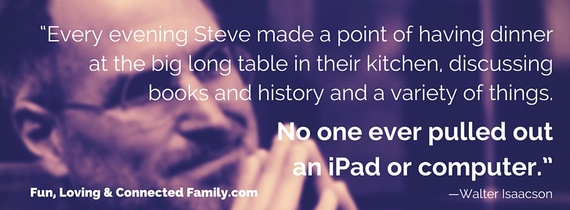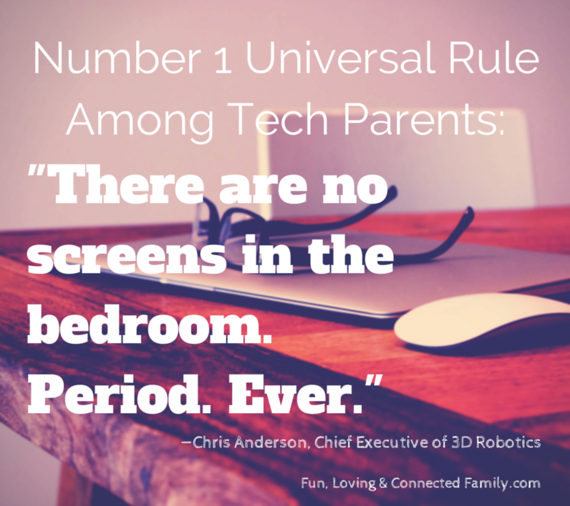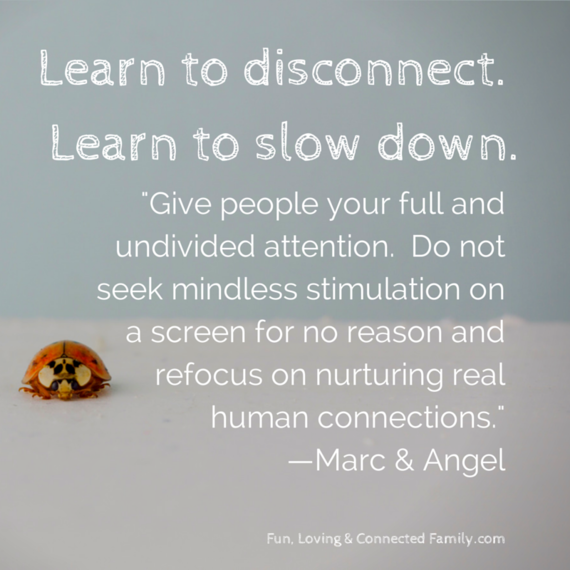He'd Lay Down Some Digital Dharma To Get Your Family Fun, Loving & (Really) Connected.
When we're checking in with our kids about what's happened at school today, are our eyes darting over to a screen, checking for texts or scanning through emails?
If we're frustrated with not getting our kids' full attention -- much less eye contact from them -- we need to own up to what we're modeling with our loved ones and seriously reconsider just how short our leads are to our screen of choice.
As it turns out, the late, great Steve Jobs has our back when it comes to digital dharma for families. Although it'd be easy to assume that Chez Jobs was the equivalent of a Willy Wonkaesque tech wonderland -- quite the opposite was true.
In an interview with Walter Isaacson, Jobs revealed that not only did he and his wife limit how much technology their kids used at home, his children did not even have iPads.
Walter Isaacson, author of Steve Jobs, has said:
Every evening Steve made a point of having dinner at the big long table in their kitchen, discussing books and history and a variety of things. No one ever pulled out an iPad or a computer.
Steve wasn't the only tech giant to impose strict limitations on the kid's screen time -- many Silicon Valley titans ban all digital gadgets on school nights and allocate austere limits for weekends. Chris Anderson, the former editor of Wired who's now heading up drone maker 3D Robotics, has stringent time limits and parental controls on every device in his home. Even though Rob and his wife are accused by their five kids, aged 6 to 17, of being fascists -- they hold firm.
Why? Because of the downsides of unregulated digital access they've seen firsthand -- that naturally they want to protect their own kids from. Those dangers include getting addicted to their devices as well as exposure to harmful content like pornography and cyberbullying.
Many tech industry parents give weekly limits of 30 minutes to two hours for iPad and smartphones and many wait until 14 to even give their children smartphones to make calls and text -- with data plans held back until 16. That's quite a bit later than our kids would like us to believe!
Try this:
- Turn your phone off before you walk through the front door. Let's break free from constantly checking our devices for texts, emails and updates to actually be fully present with the people we love.
- If you have a job that requires you to be contactable, that's a completely different kettle of fish -- I'm not advocating any kind of irresponsibility. This is about changing our habit of constantly checking our devices for texts, emails and updates.
- Follow the lead of tech parents and don't allow screens of any kind in your kids' bedrooms by keeping all digital devices in shared spaces.
- No digital anything during mealtimes -- better yet, gather your family into the kitchen together while dinner's being made.
- Create guidelines for when you and your tweens can check in with your digital lives. You'll all soon discover that the world does not end when you're offline.
- You'll need to decide which social networks are appropriate for your kids. Most tech parents only allow Snapchat -- which deletes messages after they're sent -- and that's for their teenagers -- no social networking allowed for younger members of your tribe.
- If you haven't already, now's the time you need to explain to your kids about the reality of online sexual predators as well as both the short- and long-term effects of sexting.
- Make a clear distinction on online time spent passively consuming and actively creating -- and this is key in how all of us interact with technology. I've got loads of ideas and resources to make that shift from passive interaction into active creation that brings the best of what's available online into your tweenager's and your family life.
- You could go old school and have a Wi-Fi-free day -- seriously get off the grid and step into real life -- or extend it to a full weekend. William Powers has coined this as an Internet Sabbath, where your Wi-Fi gets turned off from Friday night to Monday morning. Why not try it for a weekend and see how time opens up for everyone?
- Power down: It's hugely beneficial for all of us to turn off screens of every kind for at least 60 minutes before bedtime. Stony Brook University has just published a report that finds that children who have an electronic device in their bedrooms sleep on average up to one hour less per night.
- Just this one simple practice will beneficially boost not only the quality of everyone's sleep, but will boost your tween's brainpower and brain development. You'll also have a "new" block of time where you can find ways to be together before you hit the hay.
Rule Breaker Alert
As much as I love the space that's created by my family's screen-free zone before bed, we do love our Friday night movies... So that's our exception, and sometimes extends into Saturday nights too. But I will say that this one practice for school nights has been hugely beneficial for everyone in the family. We all feel so much less rushed and hassled during the week just by having that down time at the end of the day.
Sources:
Steve Jobs Was a Low-Tech Parent by Nick Bilton, The New York Times
"What's Keeping Your Kids Up At Night?" Dr. Jill Creighton, Stonybrook University
"Hamlet's Blackberry" by William Powers


